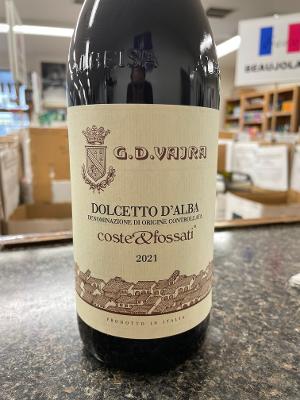 Grapes are peculiar things, complicated in their subtleties and personalities. It's never as straightforward as just planting a grape in a vineyard, there are various clones and biotypes within each variety that can have an effect on the final wine flavor and quality. Most of these differences evolve (naturally or 'forced') to have vines be more productive or better resistance to environmental issues, and often the ones that show the best finished quality of wine end up being the ones with more deficiencies in these areas. Which brings us to the story of this wine, when in the 1970s many producers in the Piedmont region started to plant 'new' clones of Dolcetto that were touted as being more prolific but made a simpler wine. At the time most Dolcetto was built to be straightforward anyway and volume was more important, but some like the Vajra family preferred the older heritage clones. Over the course of six years the family collected these older clones (identifiable by their unique red stalk close to the clusters) and grafted them into parcels in their Coste di Vergne and Fossati vineyards in Barolo. The wine made from these two parcels is routinely one of the best versions of Dolcetto available, always pulling in a little extra layer of character and quality. Deep plum and cool dark fruits on the nose with a savory dried thyme note and a touch of cola, more deep and nuanced than usually found here. The palate is rich and full, soft and a bit grapey at first but getting some savory texture and a bit of fine polished tannin at the finish, and building more black cherry notes as it opens up. A great food wine, especially for those that may not like the acidity of a Nebbiolo or Barbera, and one of the best options for rich comfort foods like stews or lasagna.
0 Comments
Leave a Reply. |
The Best of the Best.We offering free tastings on these wines in the store every Thursday and Friday, and a 10% discount off the retail price through the duration of the day. Come on by and give them a try! Archives
July 2024
Categories |
Location |
|

 RSS Feed
RSS Feed